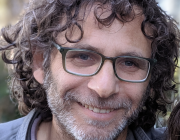In the frame of this course we’ll learn about the dialogical relation between the Modern Hebrew Culture and the Yiddish Culture as it was reflected in the discourse around Yiddish Theater in the State of Israel between the years 1948-2003.
Looking into the power-struggle between Hebrew and Yiddish, it seems that the establishment of Hebrew as the national language of the new state (as the local and native language, as the language of power and knowledge), occurred parallel to a constant process of repression and alienation of Yiddish culture and language. This occurred alongside the repression and alienation of all “Diaspora cultures”. All cultural activity in Yiddish became a transgression, forbidden knowledge for the new Hebrew, Zionist citizen. At the same time that Hebrew became the norm, Yiddish became, in its diasporic status, the abnormal. Yiddish as knowledge had lost its value, of a knowledge that the new citizen must get rid of. Yiddish was defined as a danger, as an enemy which had the potential to overshadow the new Hebrew culture and language. Therefore a system of defense and control had to be developed, a system which makes use of different ways of frightening and intimidating.
In the field of Yiddish theatre, these methods received, in the first years of the Jewish state, a juridical form in the prohibition to local troupes to perform in Yiddish, methods that became more sophisticated as time went by. The edicts of the Israeli policy, the banning of Yiddish performances, were replaced by an economic policy of the Israeli institutions on one hand, and by the discourse in the Hebrew press on the other hand. Those methods compelled and gave legitimacy to the process of repression of the Yiddish theatre and of Yiddish culture, leaving them outside the norm and the “good taste”. The Yiddish theatre was physically removed and later on rhetorically from the Israeli cultural scene at least till the creation of the Yiddishpiel theatre, which opened another chapter in the history of the Yiddish theatre in Israel.
We'll learn about the main theater troupes and productions that left a mark in the history of Yiddish theater in Israel, from Dzigan and Schumacher, through the Burstein Family in the Megile-lider at the Hammam theater in Jaffa, till Shmuel Atsmon and the Yiddishpiel.
Looking into the power-struggle between Hebrew and Yiddish, it seems that the establishment of Hebrew as the national language of the new state (as the local and native language, as the language of power and knowledge), occurred parallel to a constant process of repression and alienation of Yiddish culture and language. This occurred alongside the repression and alienation of all “Diaspora cultures”. All cultural activity in Yiddish became a transgression, forbidden knowledge for the new Hebrew, Zionist citizen. At the same time that Hebrew became the norm, Yiddish became, in its diasporic status, the abnormal. Yiddish as knowledge had lost its value, of a knowledge that the new citizen must get rid of. Yiddish was defined as a danger, as an enemy which had the potential to overshadow the new Hebrew culture and language. Therefore a system of defense and control had to be developed, a system which makes use of different ways of frightening and intimidating.
In the field of Yiddish theatre, these methods received, in the first years of the Jewish state, a juridical form in the prohibition to local troupes to perform in Yiddish, methods that became more sophisticated as time went by. The edicts of the Israeli policy, the banning of Yiddish performances, were replaced by an economic policy of the Israeli institutions on one hand, and by the discourse in the Hebrew press on the other hand. Those methods compelled and gave legitimacy to the process of repression of the Yiddish theatre and of Yiddish culture, leaving them outside the norm and the “good taste”. The Yiddish theatre was physically removed and later on rhetorically from the Israeli cultural scene at least till the creation of the Yiddishpiel theatre, which opened another chapter in the history of the Yiddish theatre in Israel.
We'll learn about the main theater troupes and productions that left a mark in the history of Yiddish theater in Israel, from Dzigan and Schumacher, through the Burstein Family in the Megile-lider at the Hammam theater in Jaffa, till Shmuel Atsmon and the Yiddishpiel.

